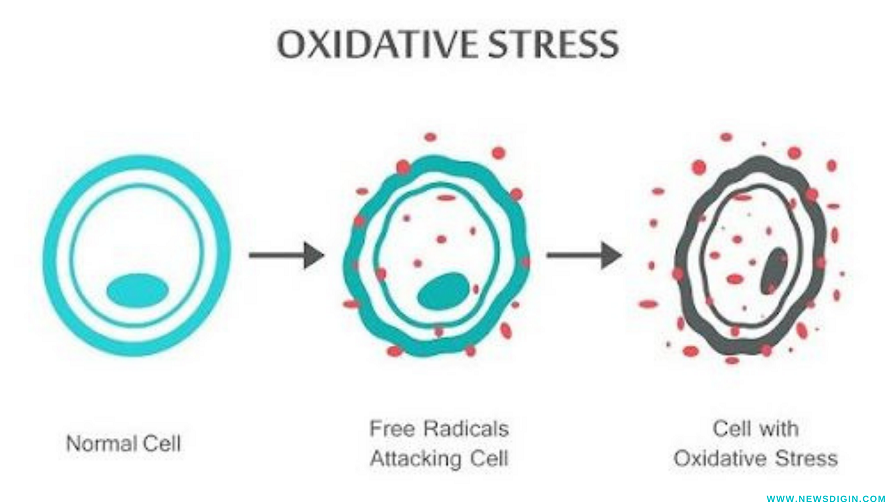
Free Radical Dna Damage | Things You Should Know About Oxidative Stress: Hey guys today I am sharing some useful information about oxidative stress. May this information is useful and blownup your mind.
Free Radical Dna Damage | Things You Should Know About Oxidative Stress

What Is Oxidative Stress
Oxidative stress cause by an imbalance in your body’s free radicals and antioxidants. Free radicals are oxygen molecules with an unequal number of electrons.
Because of their odd number, they can quickly react with other molecules. Because free radicals respond so quickly with other molecules, they can cause significant chain chemical reactions in your body.
Therefore these reactions are referred to as oxidation. They can be beneficial or detrimental.
Antioxidants are molecules that donates an electron to a free radical while remaining stable themselves. As a consequence, the free radical stabilizes and becomes less reactive.
The Body’s Reactions To Oxidative Stress
Oxidation is a natural and necessary process that occurs in your body. When there is an imbalancing between free radical activity and antioxidant activity, oxidative stress occurs.
When functioning correctly, free radicals can aid in the fight against pathogens. Pathogens cause infections.
When there are additional free radicals present than antioxidants can keep in check, the free radicals can begin to damage fatty tissue, DNA, and proteins in body.
Proteins, lipids, and DNA makes up a large portion of your body, so that damage can result in a wide range of diseases over time. These are some examples:
- Diabetes
- The hardening of the blood vessels is known as atherosclerosis.
- Inflammatory disorders
- Hypertension, or high blood pressure, is another term for high blood pressure.
- coronary heart disease
- Parkinson’s and Alzheimer’s are two examples of neurodegenerative diseases.
- cancer
- Oxidative stress is also a factor in aging.
What Are The Dangers?
Everyone’s body naturally produces some free radicals as a result of processes such as exercise or inflammation. It is normal and part of the body’s intricate system of self-preservation.
In addition, you may be exposed to free radicals in the environment. Among the sources are:
- Ozone
- Pesticides and household cleaners
- Tobacco smoke
- Radiation
- Pollution
- A high-sugar, high-fat, and high-alcohol diet may also contribute to free radical production.
Controlling And Avoiding Oxidative Stress
Therefore it is impossible for avoiding free radicals and oxidative stress entirely. However, things you can do for reducing the effects of oxidative stress on your body.
The main thing you can do is increase your antioxidant levels and decrease your free radical formation.
Hence one way to prevent oxidative stress is to make sure you’re getting enough antioxidants in your diet.
Therefore eating 5 serves of fruits and vegetables per day is the best way to give your body what it need for producing antioxidants. Fruits and vegetables include the following:
- Berries
- Cherries
- Clementines
- Prunes
- Greens with a lot of leaves
- Broccoli
- Carrots
- Tomatoes
- Olives
Other sources of antioxidants in the diet include:
- Nuts and fish
- E-vitamin
- C vitamin
- Turmeric
- A cup of green tea
- Melatonin
- Onion
- Garlic
- Cinnamon
Other healthy lifestyle choices can also help to prevent or mitigate oxidative stress.
Here Are Some Lifestyle Options To Consider
A routine of moderate exercise regularly. Hence it has been linked to higher natural antioxidant levels and minor oxidative stress damage.
Regular Exercise
It link to a longer lifespan, fewer aging effects, and a lower risk of cancer and disease.
Hence don’t light up. Avoid inhaling secondhand smoke as well.
When working with chemicals, exercise extreme caution. It includes avoiding unnecessary radiation exposure, cleaning chemicals, and aware of other sources of chemical exposure, such as pesticides use on food or in gardening.
Keep an eye on the environment. Therefore carpooling and other environmentally friendly initiatives can help you and your community reduces free radical production.
Apply Sunscreen To Your Skin
Sunscreen protecting skin from the harmful effects of ultraviolet light.
Reduce Your Alcohol Consumption.
Also, Get lots of rest. A night’s sleep is important for maintaining balance in all of your body’s systems. Therefore sleep impacts brain function, hormone production, antioxidant and free radical balance, and a variety of other things.
Overeating should be avoided. Overeating and constant eating have been shown in studies to put your body in a state of oxidative stress more frequently than eating at appropriately spaced intervals and in minor or moderate portions.
Read Also: